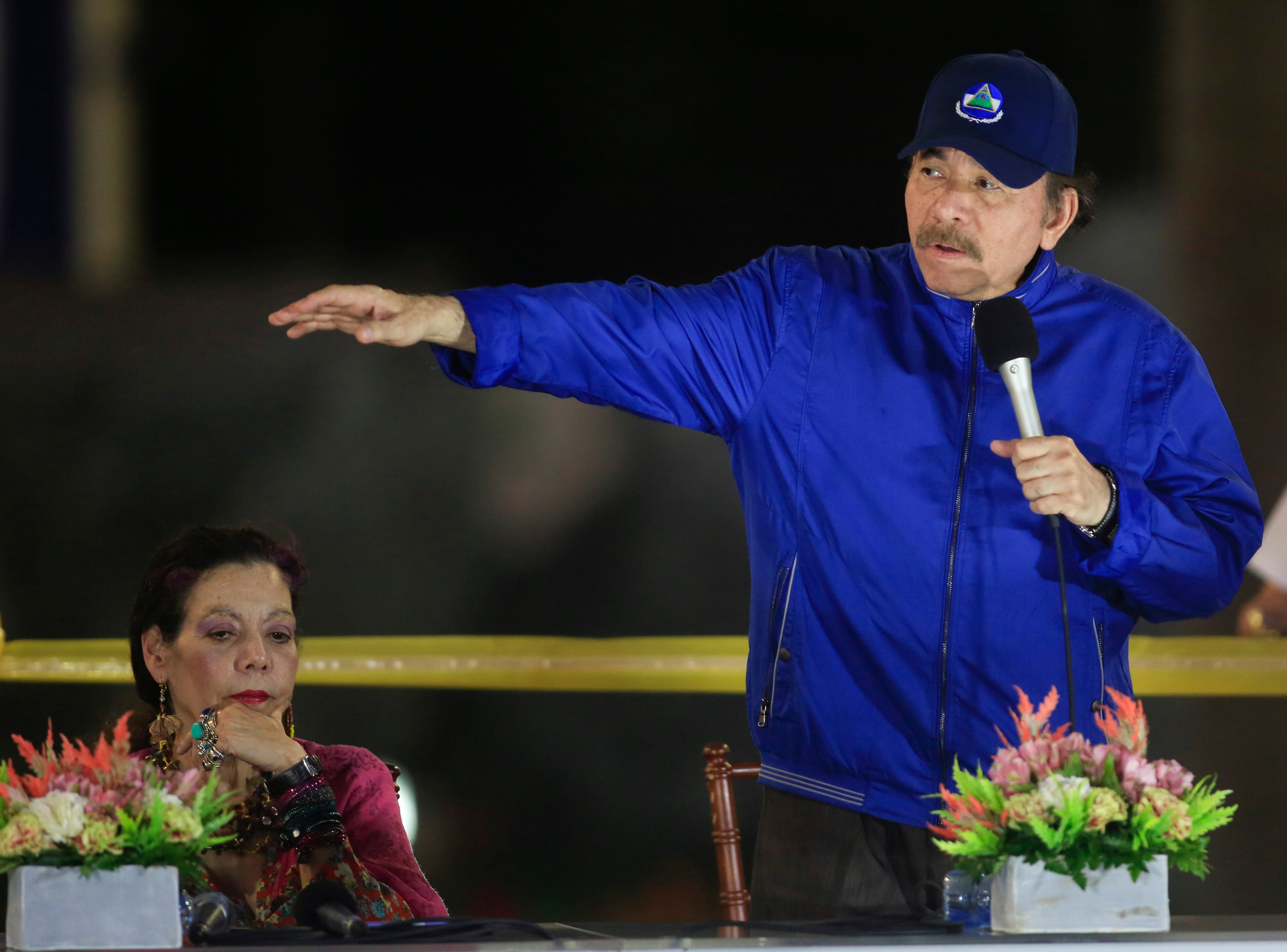Rights group calls for more pressure on Nicaragua government
An international human rights organization is calling for increased pressure on Nicaragua President Daniel Ortega as arrests of political opposition figures continue ahead of Nov. 7 elections

Your support helps us to tell the story
From reproductive rights to climate change to Big Tech, The Independent is on the ground when the story is developing. Whether it's investigating the financials of Elon Musk's pro-Trump PAC or producing our latest documentary, 'The A Word', which shines a light on the American women fighting for reproductive rights, we know how important it is to parse out the facts from the messaging.
At such a critical moment in US history, we need reporters on the ground. Your donation allows us to keep sending journalists to speak to both sides of the story.
The Independent is trusted by Americans across the entire political spectrum. And unlike many other quality news outlets, we choose not to lock Americans out of our reporting and analysis with paywalls. We believe quality journalism should be available to everyone, paid for by those who can afford it.
Your support makes all the difference.An international human rights organization is calling for increased pressure on Nicaragua President Daniel Ortega as arrests of political opposition figures continue ahead of Nov. 7 elections.
Human Rights Watch planned to release a report Tuesday detailing the politically motivated arrests in recent weeks of nearly 20 opposition pre-candidates, prominent businessmen, former government officials and political leaders. The Associated Press received a copy of the report in advance.
The organization called on the United Nations Security Council to invoke Article 99 of its charter “to raise this issue in the U.N. Security Council and present it as a growing crisis involving grave human rights abuses which could undermine stability in the region.”
Ortega is seeking a fourth consecutive term as president and has been systematically clearing his path of potential challengers through arrests for alleged crimes against the state. The government had already significantly reduced the public space for opposition to maneuver through repressive laws and intimidation.
“High-profile arrests and other serious human rights violations against critics appear to be part of a broader strategy to eliminate political competition, stifle dissent, and pave the way for President Daniel Ortega’s re-election to a fourth consecutive term,” Human Rights Watch said.
Late Monday, Nicaragua police announced they had placed former first lady María Fernanda Flores Lanzas, wife of ex-President Arnoldo Aleman, under house arrest for alleged crimes against the state.
There was no mention of Aleman or his whereabouts. The police statement said she would remain under guard while the allegations against her were investigated.
Also Monday, journalist Carlos Fernando Chamorro, son of former President Violeta Barrios de Chamorro, said via Twitter that police had raided his home. He demanded they respect the well-being of his sister-in-law and others with her.
“They will not be able to silence journalism,” he wrote. In May, police raided the offices of his online news outlet Confidencial. The government seized the outlet’s old offices in December 2018.
Earlier, Nicaraguan writer and former Vice President Sergio Ramírez said there was no chance of free and fair elections in Nicaragua and that the opposition should refuse to participate in voting that would only legitimize Ortega’s victory.
Last week, most members of the Permanent Council of the Organization of American States condemned the Nicaraguan government’s actions and called for the immediate release of political prisoners. On Monday, Argentina and Mexico, two countries who abstained from the vote, recalled their ambassadors from Nicaragua for consultation over the developments.
Earlier this month, the U.S. Treasury Department slapped sanctions on Ortega’s daughter and a top army official, as well as several others close to the president.
“The gravity and intensification of the Ortega government’s brutal crackdown on critics and members of the opposition in recent weeks requires a redoubling of international pressure,” said José Miguel Vivanco, Americas director at Human Rights Watch.
The report noted that more than 108,000 Nicaraguans have fled the country since street protests began in April 2018 and were violently put down by the government. The Inter-American Commission on Human Rights found that 328 people were killed and some 2,000 wounded. Ortega has maintained those protests were a foreign-backed coup attempt.
Most of the arrests in recent weeks have been related to allegations that opposition figures accepted foreign financing for activities against the government.
Even before the latest crackdown, more than 100 political prisoners were already jailed in Nicaragua, the report said. Among them, Human Rights Watch has documented three cases of women who suffered assault and sexual aggression during their imprisonment.
In developing the report, Human Rights Watch interviewed 53 people in Nicaragua, including 46 activists, lawyers, journalists, human rights defenders and opposition figures who were victims of harassment of arbitrary detention. It said the government had not responded to its request for information on those cases.
Government targets frequently report police vehicles parked outside their homes that prevent them from leaving.
“There is virtually no chance Nicaraguans can exercise their fundamental rights to freedom of expression, assembly, and association, nor to vote and run for public office, if they are seen as opposing the ruling party,” Vivanco said. “Top UN officials and UN member countries that care about human rights have an opportunity to prevent a regional crisis by pressuring Ortega to end his repression now. They should seize it.”